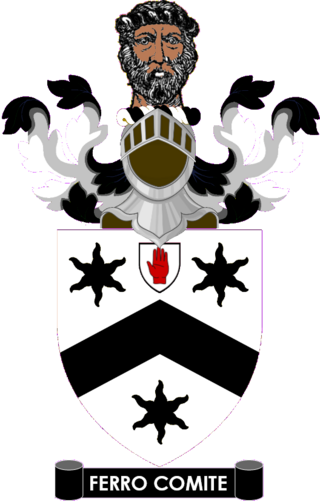
Earl of Chichester is a title that has been created three times, twice in the Peerage of England and once in the Peerage of the United Kingdom. The current title was created in the Peerage of the United Kingdom in 1801 for Thomas Pelham, 2nd Baron Pelham of Stanmer.

Sir Roger L'Estrange was an English pamphleteer, author, courtier, and press censor. Throughout his life L'Estrange was frequently mired in controversy and acted as a staunch ideological defender of King Charles II's regime during the Restoration era. His works played a key role in the emergence of a distinct 'Tory' bloc during the Exclusion Crisis of 1679-81. Perhaps his best known polemical pamphlet was An Account of the Growth of Knavery, which ruthlessly attacked the parliamentary opposition to Charles II and his successor James, Duke of York, placing them as fanatics who misused contemporary popular anti-Catholic sentiment to attack the Restoration court and the existing social order in order to pursue their own political ends. Following the Exclusion Crisis and the failure of the nascent Whig faction to disinherit James, Duke of York in favour of Charles II's illegitimate son James, 1st Duke of Monmouth L'Estrange used his newspaper The Observator to harangue his opponents and act as a voice for a popular provincial Toryism during the 'Tory Reaction' of 1681-85. Despite serving as an MP from 1685-89 his stock fell under James II's reign as his staunch hostility to religious nonconformism conflicted with James' goals of religious tolerance for both Catholics and Nonconformists. The Glorious Revolution of 1688 and the collapse of the Restoration political order heralded the end of L'Estrange's career in public life, although his greatest translation work, that of Aesop's Fables, saw publication in 1692.

The Blois Baronetcy, of Grundisburgh and Cockfield Hall in the County of Suffolk, is a title in the Baronetage of England. It was created on 15 April 1686 for Charles Blois. He represented Ipswich and Dunwich in the House of Commons. The seventh Baronet was a Major in the 1st Dragoons and fought at the Battle of Waterloo in 1815.
There have been two baronetcies created for persons with the surname Joseph, both in the Baronetage of the United Kingdom. One creation is extinct while one is extant.
There have been four baronetcies created for persons with the surname Dundas, one in the Baronetage of Great Britain and three in the Baronetage of the United Kingdom. One creation is extant as of 2008.

The Mordaunt Baronetcy, of Massingham Parva in the County of Norfolk, is a title in the Baronetage of England. It was created on 29 June 1611 for Lestrange Mordaunt, who had earlier distinguished himself in the Wars of the Low Countries during the reign of Elizabeth I. The fifth, sixth, seventh and eighth Baronets all represented Warwickshire in the House of Commons. The ninth and tenth Baronets sat as Members of Parliament for Warwickshire South.

There have been three baronetcies created for persons with the surname Carew, two in the Baronetage of England prior to 1707, one in the Baronetage of Great Britain.
Sir Nicholas le Strange of Hunstanton, Norfolk, was an English Member of Parliament (MP).

Sir William Spring, 1st Baronet was an English Parliamentarian politician and a member of the Spring family of Pakenham, Suffolk.
Hamon L'Estrange (1605–1660) was an English writer on history, theology and liturgy, of Calvinist views, loyal both to Charles I and the Church of England. Along with Edward Stephens, he contributed to the seventeenth-century revival of interest in ancient liturgies; with John Cosin and Anthony Sparrow he began the genre of commentary on the Book of Common Prayer. He has been confused at times with his father, son and grandson of the same name.
The Langley Baronetcy, of Higham Gobion in the County of Bedford, was a title in the Baronetage of England. It was created on 29 May 1641 for William Langley. The title became extinct on the death of the fifth Baronet in circa 1790.

There have been four baronetcies created for persons with the surname Martin, one in the Baronetage of England, one in the Baronetage of Great Britain and two in the Baronetage of the United Kingdom. All creations are now extinct.
The Wolstenholme Baronetcy, of London, was a title in the Baronetage of England. It was created on 10 January 1665 for John Wolstenholme, who had previously represented West Looe, Newport and Queenborough in Parliament. He had been heavily fined by the Parliamentarians for supporting the Royal cause during the Civil War. The third Baronet sat as Member of Parliament for Middlesex. The title became extinct on the death of the seventh Baronet in 1762.
L'Estrange and its various spelling variants represent an English surname, derived from the French word for foreigner and may refer to any of the following people or characters.
Sir Hamon le Strange was an English politician who sat in the House of Commons at various times between 1614 and 1626. He supported the Royalist cause in the English Civil War. His family were Norfolk gentry long based at their manor of Hunstanton.

Sir Roger Martin, 2nd Baronet was son of Sir Roger Martin, 1st Baronet and Tamworth, daughter of Edward Horner of Mells, Somerset. He inherited his baronetcy from his father, who was the first Martin Baronet of Long Melford created on 28 March 1667, upon his death in 1712.

Sir Roger Martin, 3rd Baronet was son of Sir Roger Martin, 2nd Baronet and Anna-Marie Harvey. He inherited his baronetcy from his father, who was the second Martin Baronet of Long Melford, upon his death in 1762.
Sir Nicholas L'Estrange, 4th Baronet (1661–1724), of Hunstanton, Norfolk, was an English Tory politician.

Alice L'Estrange or Alice Le Strange born Alice Stubbe was an English keeper of household and estate accounts at Hunstanton Hall in Old Hunstanton.
Sir Nicholas L'Estrange, 1st Baronet was an English baronet and collector of anecdotes.








